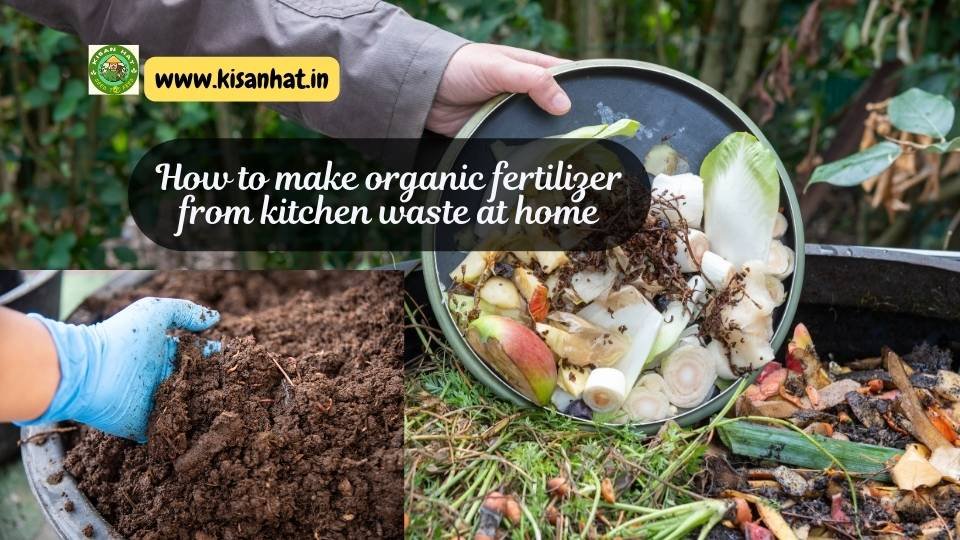How to make organic fertilizer from kitchen waste at home!
Organic fertilizers are a great way to nourish your plants while reducing waste. Making your own organic fertilizer from kitchen waste is not only cost-effective but also eco-friendly. By repurposing food scraps, you can create nutrient-rich compost that will benefit your garden or indoor plants.
In this blog post, we will guide you through the process of making organic fertilizer from kitchen waste at home.
How to make organic fertilizer from kitchen waste at home – Steps
Gather Your Kitchen Waste
The first step in making organic fertilizer is to collect your kitchen waste. This can include fruit and vegetable scraps, coffee grounds, tea leaves, eggshells, and even crushed nutshells. Avoid using any meat, dairy products, or oily foods, as they can attract pests and cause unpleasant odors.
It’s a good idea to have a designated container in your kitchen for collecting these scraps. You can use a small bin or a composting bucket with a lid to prevent any odors. Make sure to empty and clean the container regularly to maintain hygiene.
Composting the Kitchen Waste
Once you have gathered your kitchen waste, it’s time to start the composting process. Composting is the natural decomposition of organic materials into nutrient-rich soil. Here’s how you can compost your kitchen waste:
- Choose a composting method: There are several composting methods you can choose from, depending on your space and preferences. You can opt for a traditional outdoor compost pile, a compost bin, or even an indoor worm composting system.
- Add a carbon source: To create a balanced compost pile, you need to add a carbon source along with your kitchen waste. Carbon-rich materials include dry leaves, straw, shredded paper, or cardboard. Aim for a ratio of roughly 3 parts carbon to 1 part kitchen waste.
- Layer the materials: Start by adding a layer of carbon-rich material at the bottom of your composting container. Then, add a layer of kitchen waste on top. Continue layering until you have used all the materials, making sure to end with a layer of carbon-rich material.
- Moisten the pile: Your compost pile should be moist, but not soggy. If it feels too dry, you can add some water to help kickstart the decomposition process. Avoid overwatering, as it can lead to bad odors and the growth of anaerobic bacteria.
- Aerate the pile: To promote decomposition, it’s important to aerate your compost pile regularly. You can do this by turning the materials with a pitchfork or a compost aerator. This helps to introduce oxygen and speed up the breakdown of organic matter.
Wait and Watch
After setting up your compost pile, all you need to do is wait and watch as nature takes its course. The decomposition process can take anywhere from a few weeks to several months, depending on various factors such as temperature, moisture, and the size of your compost pile.
During this time, you may notice changes in the appearance and smell of your compost pile. It’s normal for the materials to break down and transform into a dark, crumbly substance that resembles soil. If you detect any foul odors, it may indicate that the pile is too wet or not getting enough air. In such cases, you can adjust the moisture level or turn the pile more frequently.
Using Your Homemade Organic Fertilizer
Once your kitchen waste has fully decomposed into compost, you can start using it as organic fertilizer. Here are a few ways you can utilize your homemade fertilizer:
- Top-dressing: Sprinkle a thin layer of compost around the base of your plants. This will slowly release nutrients into the soil as it breaks down.
- Mixing with potting soil: Blend the compost with potting soil to create a nutrient-rich mixture for your indoor plants or container gardens.
- Compost tea: Steep a handful of compost in water for a few days to create compost tea. This liquid fertilizer can be used to water your plants or applied as a foliar spray.
Remember to store any excess compost in a cool, dry place to preserve its quality. Regularly check the moisture level and turn the pile if necessary to prevent the growth of mold or pests.
The Importance of Organic Fertilizers for Plants in India
Conclusion
Making organic fertilizer from kitchen waste is a simple and rewarding process. By composting your food scraps, you not only reduce waste but also create a valuable resource for your plants.
Whether you have a small garden or a few potted plants, homemade organic fertilizer can nourish your greenery and contribute to a healthier environment.



